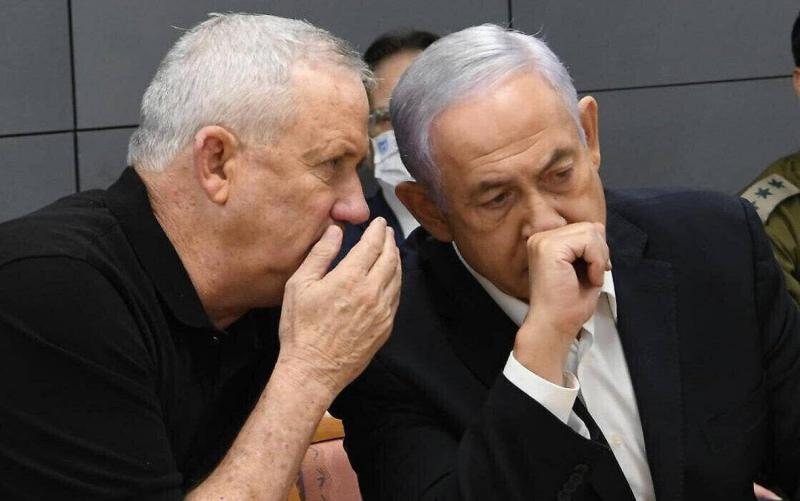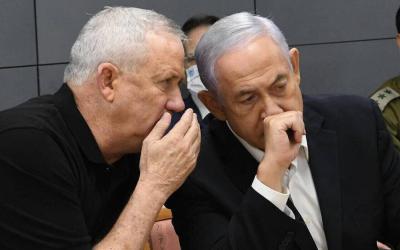Benjamin Netanyahu has secured his place in history. He spent more time in the prime minister's office than the "founding father" David Ben-Gurion. He has killed more Palestinians than all his generals combined. Rarely has a tyrant in modern times been able to kill such a vast number of children. In response to the "deluge of Al-Aqsa," he has inflicted a new catastrophe on the Palestinians, more painful than the first. There is no exaggeration in this statement. The massacre in Gaza is more horrific than the massacres during the Yugoslav explosion. It is more dangerous than the Rwandan massacres because it is managed by a government that is executed by a standing army. We have not seen in the most intense wars bulldozers collecting this number of small corpses and burying them. We have not seen children scramble for a piece of bread while horror devours their mothers' eyes. We have not witnessed such immense devastation since the invasion of Berlin during World War II. Netanyahu goes to history carrying with him tens of thousands of corpses. But he does not go assured. He has not been able to accomplish the mission of erasing the Palestinian people. This mission is impossible. And he has not been able to carry with him the corpse of the dream of an independent Palestinian state. Joe Biden himself sees no horizon other than the two-state solution.
Let us set Netanyahu aside. The world is complicit in this ongoing crime. It has watched for a long time the river of Palestinian pain. It has been satisfied with ceasefires and sending tents, aid, and bandages. It has not dared to confront the real question: Why is the Palestinian people still without a state on their land or part of it? I recalled that the question posed today to Yahya Sinwar, the leader of "Hamas" in Gaza and the "Engineer of the Deluge," resembles the question posed half a century ago to Dr. Wadie Haddad, the "plane hijacker" and head of the "external front" in the "Popular Front for the Liberation of Palestine." The visit was surrounded by complete secrecy. Haddad was taken to an office in a forest near Moscow. Officials from the KGB asked Haddad about the two-state solution, so he responded that he would accept nothing less than the return of every inch of Palestine. When his interlocutors reminded him of the innocent lives lost in Palestinian operations, he asked them to review what accompanied the "Red Army's" invasion of Berlin. At the end of the talks, Haddad met with KGB chief Yuri Andropov, who later ascended to the Kremlin throne. The practical outcome of the visit was Moscow's agreement to provide the "external front" with a handful of quality weapons, which he later received off the coast of Aden.
Haddad found it extremely difficult to accept the idea of conceding his hometown of Safed or any other inch of Palestine. In those days, it was hard for any Palestinian leader to accept this because, for the people, it meant committing the gravest betrayal. The reality shown by the current massacre of Gaza is that the erasure of the Palestinian people is impossible. But it also showed that the world will not allow the erasure of the state of Israel. Therefore, returning from the current war resembles a call to swallow poison. The cancellation of the other is impossible and forbidden, and the only feasible exit is the two-state solution in the hope that the current war will be the last of the Palestinian-Israeli wars.
How horrific it is for hunger to attack the people of Gaza as if it is participating with the planes in their killings! How cruel it is for children to look to the skies, hoping to see aid descending by parachutes! Every assistance is appreciated and deserves thanks. But the scenes are not simple. The master of the White House could not force Netanyahu to accept a ceasefire or a permanent end to the fighting. He decided to coexist once again with the river of pain, waiting for the "ripening of conditions." An American port off Gaza and a maritime aid line from Cyprus were hoped for before Ramadan arrived.
Israel will not emerge victorious from this war, no matter how many Palestinians its army kills. It has become a heavy burden on its supporters. Sympathy for it has transformed into a moral scandal that shook the image of the West. Moreover, the war will achieve the opposite of what it aimed because the world has become more convinced that the two-state solution is the only pathway to security, stability, and an end to the killing.
This is a war with many bitter realities. Israel will ultimately recover prisoners and corpses. But an independent state is a nightmare that cannot be banished. And "Hamas" will recover prisoners from the occupation's jails, but their number will certainly be fewer than those killed on the ground in Gaza. I think about Yahya Sinwar, the leader of the current battle. I do not know how he feels as he listens to Biden talk about commissioning the U.S. military to build a port off Gaza for aid delivery? How does he feel when he sees American parachutes descending carrying aid? How does he feel when he hears that reconstruction in the "day after" is conditioned on the absence of "Hamas" tunnels and missiles from Gaza?
I was struck by the words of more than one Palestinian leader, including Yasser Abed Rabbo, that "Sinwar surprised his allies on the seventh of October and was then shocked by the scale of what the (Qassam) attack achieved that day." Is it true that Sinwar did not expect such a breakthrough at the beginning of the "deluge"? And is it true that he did not foresee a complete catastrophe for the sector due to the Israeli response?
The question posed to Sinwar is the same as the one posed to Haddad in Moscow half a century ago: Will the Palestinians accept some land to establish their independent state next to Israel? Sinwar accepts the idea of an independent state provided that he is not asked to recognize Israel, a condition that the West does not concede. The Nakba is dreadful. Can "Hamas" quickly return to the Palestinian home with a position that obliges the world to establish a specific mechanism for the birth of an independent Palestinian state? Between the question posed to Haddad and the question currently posed to Sinwar, the world has squandered an opportunity shaped by Yasser Arafat's experience, who tried to shorten his people's suffering but collided with Israeli political blindness, American bias, and Western cowardice.




